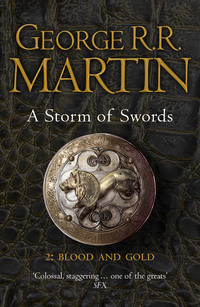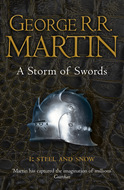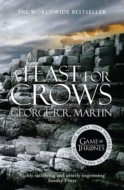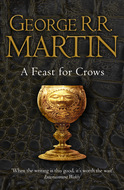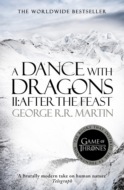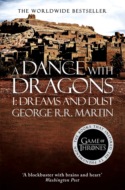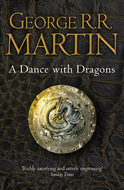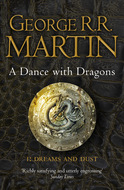Kitap dosya olarak indirilemez ancak uygulamamız üzerinden veya online olarak web sitemizden okunabilir.
Kitabı oku: «A Storm of Swords: Part 2 Blood and Gold», sayfa 6
Leading the horse to the longhall was simple enough. Getting her through the door was not, but Sam persisted. Gilly was already dozing by the time he got the garron inside. He hobbled the horse in a corner, fed some fresh wood to the fire, took off his heavy cloak, and wriggled down under the furs beside the wildling woman. His cloak was big enough to cover all three of them and keep in the warmth of their bodies.
Gilly smelled of milk and garlic and musty old fur, but he was used to that by now. They were good smells, so far as Sam was concerned. He liked sleeping next to her. It made him remember times long past, when he had shared a huge bed at Horn Hill with two of his sisters. That had ended when Lord Randyll decided it was making him soft as a girl. Sleeping alone in my own cold cell never made me any harder or braver, though. He wondered what his father would say if he could see him now. I killed one of the Others, my lord, he imagined saying. I stabbed him with an obsidian dagger, and my Sworn Brothers call me Sam the Slayer now. But even in his fancies, Lord Randyll only scowled, disbelieving.
His dreams were strange that night. He was back at Horn Hill, at the castle, but his father was not there. It was Sam’s castle now. Jon Snow was with him. Lord Mormont too, the Old Bear, and Grenn and Dolorous Edd and Pyp and Toad and all his other brothers from the Watch, but they wore bright colors instead of black. Sam sat at the high table and feasted them all, cutting thick slices off a roast with his father’s greatsword Heartsbane. There were sweet cakes to eat and honeyed wine to drink, there was singing and dancing, and everyone was warm. When the feast was done he went up to sleep; not to the lord’s bedchamber where his mother and father lived but to the room he had once shared with his sisters. Only instead of his sisters it was Gilly waiting in the huge soft bed, wearing nothing but a big shaggy fur, milk leaking from her breasts.
He woke suddenly, in cold and dread.
The fire had burned down to smouldering red embers. The air itself seemed frozen, it was so cold. In the corner the garron was whinnying and kicking the logs with her hind legs. Gilly sat beside the fire, hugging her babe. Sam sat up groggy, his breath puffing pale from his open mouth. The longhall was dark with shadows, black and blacker. The hair on his arms was standing up.
It’s nothing, he told himself. I’m cold, that’s all. Then, by the door, one of the shadows moved. A big one. This is still a dream, Sam prayed. Oh, make it that I’m still asleep, make it a nightmare. He’s dead, he’s dead, I saw him die. “He’s come for the babe,” Gilly wept. “He smells him. A babe fresh-born stinks o’ life. He’s come for the life.”
The huge dark shape stooped under the lintel, into the hall, and shambled toward them. In the dim light of the fire, the shadow became Small Paul.
“Go away,” Sam croaked. “We don’t want you here.”
Paul’s hands were coal, his face was milk, his eyes shone a bitter blue. Hoarfrost whitened his beard, and on one shoulder hunched a raven, pecking at his cheek, eating the dead white flesh. Sam’s bladder let go, and he felt the warmth running down his legs. “Gilly, calm the horse and lead her out. You do that.”
“You—” she started.
“I have the knife. The dragonglass dagger.” He fumbled it out as he got to his feet. He’d given the first knife to Grenn, but thankfully he’d remembered to take Lord Mormont’s dagger before fleeing Craster’s Keep. He clutched it tight, moving away from the fire, away from Gilly and the babe. “Paul?” He meant to sound brave, but it came out in a squeak. “Small Paul. Do you know me? I’m Sam, fat Sam, Sam the Scared, you saved me in the woods. You carried me when I couldn’t walk another step. No one else could have done that, but you did.” Sam backed away, knife in hand, sniveling. I am such a coward. “Don’t hurt us, Paul. Please. Why would you want to hurt us?”
Gilly scrabbled backward across the hard dirt floor. The wight turned his head to look at her, but Sam shouted “NO!” and he turned back. The raven on his shoulder ripped a strip of flesh from his pale ruined cheek. Sam held the dagger before him, breathing like a blacksmith’s bellows. Across the longhall, Gilly reached the garron. Gods give me courage, Sam prayed. For once, give me a little courage. Just long enough for her to get away.
Small Paul moved toward him. Sam backed off until he came up against a rough log wall. He clutched the dagger with both hands to hold it steady. The wight did not seem to fear the dragonglass. Perhaps he did not know what it was. He moved slowly, but Small Paul had never been quick even when he’d been alive. Behind him, Gilly murmured to calm the garron and tried to urge it toward the door. But the horse must have caught a whiff of the wight’s queer cold scent. Suddenly she balked, rearing, her hooves lashing at the frosty air. Paul swung toward the sound, and seemed to lose all interest in Sam.
There was no time to think or pray or be afraid. Samwell Tarly threw himself forward and plunged the dagger down into Small Paul’s back. Half-turned, the wight never saw him coming. The raven gave a shriek and took to the air. “You’re dead!” Sam screamed as he stabbed. “You’re dead, you’re dead.” He stabbed and screamed, again and again, tearing huge rents in Paul’s heavy black cloak. Shards of dragonglass flew everywhere as the blade shattered on the iron mail beneath the wool.
Sam’s wail made a white mist in the black air. He dropped the useless hilt and took a hasty step backwards as Small Paul twisted around. Before he could get out his other knife, the steel knife that every brother carried, the wight’s black hands locked beneath his chins. Paul’s fingers were so cold they seemed to burn. They burrowed deep into the soft flesh of Sam’s throat. Run, Gilly, run, he wanted to scream, but when he opened his mouth only a choking sound emerged.
His fumbling fingers finally found the dagger, but when he slammed it up into the wight’s belly the point skidded off the iron links, and the blade went spinning from Sam’s hand. Small Paul’s fingers tightened inexorably, and began to twist. He’s going to rip my head off, Sam thought in despair. His throat felt frozen, his lungs on fire. He punched and pulled at the wight’s wrists, to no avail. He kicked Paul between the legs, uselessly. The world shrank to two blue stars, a terrible crushing pain, and a cold so fierce that his tears froze over his eyes. Sam squirmed and pulled, desperate … and then he lurched forward.
Small Paul was big and powerful, but Sam still outweighed him, and the wights were clumsy, he had seen that on the Fist. The sudden shift sent Paul staggering back a step, and the living man and the dead one went crashing down together. The impact knocked one hand from Sam’s throat, and he was able to suck in a quick breath of air before the icy black fingers returned. The taste of blood filled his mouth. He twisted his neck around, looking for his knife, and saw a dull orange glow. The fire! Only ember and ashes remained, but still … he could not breathe, or think … Sam wrenched himself sideways, pulling Paul with him … his arms flailed against the dirt floor, groping, reaching, scattering the ashes, until at last they found something hot … a chunk of charred wood, smouldering red and orange within the black … his fingers closed around it, and he smashed it into Paul’s mouth, so hard he felt teeth shatter.
Yet even so the wight’s grip did not loosen. Sam’s last thoughts were for the mother who had loved him and the father he had failed. The longhall was spinning around him when he saw the wisp of smoke rising from between Paul’s broken teeth. Then the dead man’s face burst into flame, and the hands were gone.
Sam sucked in air, and rolled feebly away. The wight was burning, hoarfrost dripping from his beard as the flesh beneath blackened. Sam heard the raven shriek, but Paul himself made no sound. When his mouth opened, only flames came out. And his eyes … It’s gone, the blue glow is gone.
He crept to the door. The air was so cold that it hurt to breathe, but such a fine sweet hurt. He ducked from the longhall. “Gilly?” he called. “Gilly, I killed it. Gil—”
She stood with her back against the weirwood, the boy in her arms. The wights were all around her. There were a dozen of them, a score, more … some had been wildlings once, and still wore skins and hides … but more had been his brothers. Sam saw Lark the Sisterman, Softfoot, Ryles. The wen on Chett’s neck was black, his boils covered with a thin film of ice. And that one looked like Hake, though it was hard to know for certain with half his head missing. They had torn the poor garron apart, and were pulling out her entrails with dripping red hands. Pale steam rose from her belly.
Sam made a whimpery sound. “It’s not fair …”
“Fair.” The raven landed on his shoulder. “Fair, far, fear.” It flapped its wings, and screamed along with Gilly. The wights were almost on her. He heard the dark red leaves of the weirwood rustling, whispering to one another in a tongue he did not know. The starlight itself seemed to stir, and all around them the trees groaned and creaked. Sam Tarly turned the color of curdled milk, and his eyes went wide as plates. Ravens! They were in the weirwood, hundreds of them, thousands, perched on the bone-white branches, peering between the leaves. He saw their beaks open as they screamed, saw them spread their black wings. Shrieking, flapping, they descended on the wights in angry clouds. They swarmed round Chett’s face and pecked at his blue eyes, they covered the Sisterman like flies, they plucked gobbets from inside Hake’s shattered head. There were so many that when Sam looked up, he could not see the moon.
“Go,” said the bird on his shoulder. “Go, go, go.”
Sam ran, puffs of frost exploding from his mouth. All around him the wights flailed at the black wings and sharp beaks that assailed them, falling in an eerie silence with never a grunt nor cry. But the ravens ignored Sam. He took Gilly by the hand and pulled her away from the weirwood. “We have to go.”
“But where?” Gilly hurried after him, holding her baby. “They killed our horse, how will we …”
“Brother!” The shout cut through the night, through the shrieks of a thousand ravens. Beneath the trees, a man muffled head to heels in mottled blacks and greys sat astride an elk. “Here,” the rider called. A hood shadowed his face.
He’s wearing blacks. Sam urged Gilly toward him. The elk was huge, a great elk, ten feet tall at the shoulder, with a rack of antlers near as wide. The creature sank to his knees to let them mount. “Here,” the rider said, reaching down with a gloved hand to pull Gilly up behind him. Then it was Sam’s turn. “My thanks,” he puffed. Only when he grasped the offered hand did he realize that the rider wore no glove. His hand was black and cold, with fingers hard as stone.
ARYA
When they reached the top of the ridge and saw the river, Sandor Clegane reined up hard and cursed.
The rain was falling from a black iron sky, pricking the green and brown torrent with ten thousand swords. It must be a mile across, Arya thought. The tops of half a hundred trees poked up out of the swirling waters, their limbs clutching for the sky like the arms of drowning men. Thick mats of sodden leaves choked the shoreline, and farther out in the channel she glimpsed something pale and swollen, a deer or perhaps a dead horse, moving swiftly downstream. There was a sound too, a low rumble at the edge of hearing, like the sound a dog makes just before he growls.
Arya squirmed in the saddle and felt the links of the Hound’s mail digging into her back. His arms encircled her; on the left, the burned arm, he’d donned a steel vambrace for protection, but she’d seen him change the dressings, and the flesh beneath was still raw and seeping. If the burns pained him, though, Sandor Clegane gave no hint of it.
“Is this the Blackwater Rush?” They had ridden so far in rain and darkness, through trackless woods and nameless villages, that Arya had lost all sense of where they were.
“It’s a river we need to cross, that’s all you need to know.” Clegane would answer her from time to time, but he had warned her not to talk back. He had given her a lot of warnings that first day. “The next time you hit me, I’ll tie your hands behind your back,” he’d said. “The next time you try and run off, I’ll bind your feet together. Scream or shout or bite me again, and I’ll gag you. We can ride double, or I can throw you across the back of the horse trussed up like a sow for slaughter. Your choice.”
She had chosen to ride, but the first time they made camp she’d waited until she thought he was asleep, and found a big jagged rock to smash his ugly head in. Quiet as a shadow, she told herself as she crept toward him, but that wasn’t quiet enough. The Hound hadn’t been asleep after all. Or maybe he’d woken. Whichever it was, his eyes opened, his mouth twitched, and he took the rock away from her as if she were a baby. The best she could do was kick him. “I’ll give you that one,” he said, when he flung the rock into the bushes. “But if you’re stupid enough to try again, I’ll hurt you.”
“Why don’t you just kill me like you did Mycah?” Arya had screamed at him. She was still defiant then, more angry than scared.
He answered by grabbing the front of her tunic and yanking her within an inch of his burned face. “The next time you say that name I’ll beat you so bad you’ll wish I killed you.”
After that, he rolled her in his horse blanket every night when he went to sleep, and tied ropes around her top and bottom so she was bound up as tight as a babe in swaddling clothes.
It has to be the Blackwater, Arya decided as she watched the rain lash the river. The Hound was Joffrey’s dog; he was taking her back to the Red Keep, to hand to Joffrey and the queen. She wished that the sun would come out, so she could tell which way they were going. The more she looked at the moss on the trees the more confused she got. The Blackwater wasn’t so wide at King’s Landing, but that was before the rains.
“The fords will all be gone,” Sandor Clegane said, “and I wouldn’t care to try and swim over neither.”
There’s no way across, she thought. Lord Beric will catch us for sure. Clegane had pushed his big black stallion hard, doubling back thrice to throw off pursuit, once even riding half a mile up the center of a swollen stream … but Arya still expected to see the outlaws every time she looked back. She had tried to help them by scratching her name on the trunks of trees when she went in the bushes to make water, but the fourth time she did it he caught her, and that was the end of that. It doesn’t matter, Arya told herself, Thoros will find me in his flames. Only he hadn’t. Not yet, anyway, and once they crossed the river …
“Harroway town shouldn’t be far,” the Hound said. “Where Lord Roote stables Old King Andahar’s two-headed water horse. Maybe we’ll ride across.”
Arya had never heard of Old King Andahar. She’d never seen a horse with two heads either, especially not one who could run on water, but she knew better than to ask. She held her tongue and sat stiff as the Hound turned the stallion’s head and trotted along the ridgeline, following the river downstream. At least the rain was at their backs this way. She’d had enough of it stinging her eyes half-blind and washing down her cheeks like she was crying. Wolves never cry, she reminded herself again.
It could not have been much past noon, but the sky was dark as dusk. They had not seen the sun in more days than she could count. Arya was soaked to the bone, saddle-sore, sniffling, and achy. She had a fever too, and sometimes shivered uncontrollably, but when she’d told the Hound that she was sick he’d only snarled at her. “Wipe your nose and shut your mouth,” he told her. Half the time he slept in the saddle now, trusting his stallion to follow whatever rutted farm track or game trail they were on. The horse was a heavy courser, almost as big as a destrier but much faster. Stranger, the Hound called him. Arya had tried to steal him once, when Clegane was taking a piss against a tree, thinking she could ride off before he could catch her. Stranger had almost bitten her face off. He was gentle as an old gelding with his master, but otherwise he had a temper as black as he was. She had never known a horse so quick to bite or kick.
They rode beside the river for hours, splashing across two muddy vassal streams before they reached the place that Sandor Clegane had spoken of. “Lord Harroway’s Town,” he said, and then, when he saw it, “Seven hells!” The town was drowned and desolate. The rising waters had overflowed the riverbanks. All that remained of Harroway town was the upper story of a daub-and-wattle inn, the seven-sided dome of a sunken sept, two-thirds of a stone roundtower, some moldy thatch roofs, and a forest of chimneys.
But there was smoke coming from the tower, Arya saw, and below one arched window a wide flat-bottomed boat was chained up tight. The boat had a dozen oarlocks and a pair of great carved wooden horse heads mounted fore and aft. The two-headed horse, she realized. There was a wooden house with a sod roof right in the middle of the deck, and when the Hound cupped his hands around his mouth and shouted two men came spilling out. A third appeared in the window of the roundtower, clutching a loaded crossbow. “What do you want?” he shouted across the swirling brown waters.
“Take us over,” the Hound shouted back.
The men in the boat conferred with one another. One of them, a grizzled grey-haired man with thick arms and a bent back, stepped to the rail. “It will cost you.”
“Then I’ll pay.”
With what? Arya wondered. The outlaws had taken Clegane’s gold, but maybe Lord Beric had left him some silver and copper. A ferry ride shouldn’t cost more than a few coppers …
The ferrymen were talking again. Finally the bent-backed one turned away and gave a shout. Six more men appeared, pulling up hoods to keep the rain off their heads. Still more squirmed out of the holdfast window and leapt down onto the deck. Half of them looked enough like the bent-backed man to be his kin. Some of them undid the chains and took up long poles, while the others slid heavy wide-bladed oars through the locks. The ferry swung about and began to creep slowly toward the shallows, oars stroking smoothly on either side. Sandor Clegane rode down the hill to meet it.
When the aft end of the boat slammed into the hillside, the ferrymen opened a wide door beneath the carved horse’s head, and extended a heavy oaken plank. Stranger balked at the water’s edge, but the Hound put his heels into the courser’s flank and urged him up the gangway. The bent-backed man was waiting for them on deck. “Wet enough for you, ser?” he asked, smiling.
The Hound’s mouth gave a twitch. “I need your boat, not your bloody wit.” He dismounted, and pulled Arya down beside him. One of the boatmen reached for Stranger’s bridle. “I wouldn’t,” Clegane said, as the horse kicked. The man leapt back, slipped on the rain-slick deck, and crashed onto his arse, cursing.
The ferryman with the bent back wasn’t smiling any longer. “We can get you across,” he said sourly. “It will cost you a gold piece. Another for the horse. A third for the boy.”
“Three dragons?” Clegane gave a bark of laughter. “For three dragons I should own the bloody ferry.”
“Last year, might be you could. But with this river, I’ll need extra hands on the poles and oars just to see we don’t get swept a hundred miles out to sea. Here’s your choice. Three dragons, or you teach that hellhorse how to walk on water.”
“I like an honest brigand. Have it your way. Three dragons … when you put us ashore safe on the north bank.”
“I’ll have them now, or we don’t go.” The man thrust out a thick, callused hand, palm up.
Clegane rattled his longsword to loosen the blade in the scabbard. “Here’s your choice. Gold on the north bank, or steel on the south.”
The ferryman looked up at the Hound’s face. Arya could tell that he didn’t like what he saw there. He had a dozen men behind him, strong men with oars and hardwood poles in their hands, but none of them were rushing forward to help him. Together they could overwhelm Sandor Clegane, though he’d likely kill three or four of them before they took him down. “How do I know you’re good for it?” the bent-backed man asked, after a moment.
He’s not, she wanted to shout. Instead she bit her lip.
“Knight’s honor,” the Hound said, unsmiling.
He’s not even a knight. She did not say that either.
“That will do.” The ferryman spat. “Come on then, we can have you across before dark. Tie the horse up, I don’t want him spooking when we’re under way. There’s a brazier in the cabin if you and your son want to get warm.”
“I’m not his stupid son!” said Arya furiously. That was even worse than being taken for a boy. She was so angry that she might have told them who she really was, only Sandor Clegane grabbed her by the back of the collar and hoisted her one-handed off the deck. “How many times do I need to tell you to shut your bloody mouth?” He shook her so hard her teeth rattled, then let her fall. “Get in there and get dry, like the man said.”
Arya did as she was told. The big iron brazier was glowing red, filling the room with a sullen suffocating heat. It felt pleasant to stand beside it, to warm her hands and dry off a little bit, but as soon as she felt the deck move under her feet she slipped back out through the forward door.
The two-headed horse eased slowly through the shallows, picking its way between the chimneys and rooftops of drowned Harroway. A dozen men labored at the oars while four more used the long poles to push off whenever they came too close to a rock, a tree, or a sunken house. The bent-backed man had the rudder. Rain pattered against the smooth planks of the deck and splashed off the tall carved horse-heads fore and aft. Arya was getting soaked again, but she didn’t care. She wanted to see. The man with the crossbow still stood in the window of the roundtower, she saw. His eyes followed her as the ferry slid by underneath. She wondered if he was this Lord Roote that the Hound had mentioned. He doesn’t look much like a lord. But then, she didn’t look much like a lady either.
Once they were beyond the town and out in the river proper, the current grew much stronger. Through the grey haze of rain Arya could make out a tall stone pillar on the far shore that surely marked the ferry landing, but no sooner had she seen it than she realized that they were being pushed away from it, downstream. The oarsmen were rowing more vigorously now, fighting the rage of the river. Leaves and broken branches swirled past as fast as if they’d been fired from a scorpion. The men with the poles leaned out and shoved away anything that came too close. It was windier out here, too. Whenever she turned to look upstream, Arya got a face full of blowing rain. Stranger was screaming and kicking as the deck moved underfoot.
If I jumped over the side, the river would wash me away before the Hound even knew that I was gone. She looked back over a shoulder, and saw Sandor Clegane struggling with his frightened horse, trying to calm him. She would never have a better chance to get away from him. I might drown, though. Jon used to say that she swam like a fish, but even a fish might have trouble in this river. Still, drowning might be better than King’s Landing. She thought about Joffrey and crept up to the prow. The river was murky brown with mud and lashed by rain, looking more like soup than water. Arya wondered how cold it would be. I couldn’t get much wetter than I am now. She put a hand on the rail.
But a sudden shout snapped her head about before she could leap. The ferrymen were rushing forward, poles in hand. For a moment, she did not understand what was happening. Then she saw it: an uprooted tree, huge and dark, coming straight at them. A tangle of roots and limbs poked up out of the water as it came, like the reaching arms of a great kraken. The oarsmen were backing water frantically, trying to avoid a collision that could capsize them or stove their hull in. The old man had wrenched the rudder about, and the horse at the prow was swinging downstream, but too slowly. Glistening brown and black, the tree rushed toward them like a battering ram.
It could not have been more than ten feet from their prow when two of the boatmen somehow caught it with their long poles. One snapped, and the long splintering craaaack made it sound as if the ferry were breaking up beneath them. But the second man managed to give the trunk a hard shove, just enough to deflect it away from them. The tree swept past the ferry with inches to spare, its branches scrabbling like claws against the horsehead. Only just when it seemed as if they were clear, one of the monster’s upper limbs dealt them a glancing thump. The ferry seemed to shudder, and Arya slipped, landing painfully on one knee. The man with the broken pole was not so lucky. She heard him shout as he stumbled over the side. Then the raging brown water closed over him, and he was gone in the time it took Arya to climb back to her feet. One of the other boatmen snatched up a coil of rope, but there was no one to throw it to.
Maybe he’ll wash up someplace downstream, Arya tried to tell herself, but the thought had a hollow ring. She had lost all desire to go swimming. When Sandor Clegane shouted at her to get back inside before he beat her bloody, she went meekly. The ferry was fighting to turn back on course by then, against a river that wanted nothing more than to carry it down to the sea.
When they finally came ashore, it was a good two miles downriver of their usual landing. The boat slammed into the bank so hard that another pole snapped, and Arya almost lost her feet again. Sandor Clegane lifted her onto Stranger’s back as if she weighed no more than a doll. The boatmen stared at them with dull, exhausted eyes, all but the bent-backed man, who held his hand out. “Six dragons,” he demanded. “Three for the passage, and three for the man I lost.”
Sandor Clegane rummaged in his pouch and shoved a crumpled wad of parchment into the boatman’s palm. “There. Take ten.”
“Ten?” The ferryman was confused. “What’s this, now?”
“A dead man’s note, good for nine thousand dragons or near-abouts.” The Hound swung up into the saddle behind Arya, and smiled down unpleasantly. “Ten of it is yours. I’ll be back for the rest one day, so see you don’t go spending it.”
The man squinted down at the parchment. “Writing. What good’s writing? You promised gold. Knight’s honor, you said.”
“Knights have no bloody honor. Time you learned that, old man.” The Hound gave Stranger the spur and galloped off through the rain. The ferrymen threw curses at their backs, and one or two threw stones. Clegane ignored rocks and words alike, and before long they were lost in the gloom of the trees, the river a dwindling roar behind them. “The ferry won’t cross back till morning,” he said, “and that lot won’t be taking paper promises from the next fools to come along. If your friends are chasing us, they’re going to need to be bloody strong swimmers.”
Arya huddled down and held her tongue. Valar morghulis, she thought sullenly. Ser Ilyn, Ser Meryn, King Joffrey, Queen Cersei. Dunsen, Polliver, Raff the Sweetling, Ser Gregor and the Tickler. And the Hound, the Hound, the Hound.
By the time the rain stopped and the clouds broke, she was shivering and sneezing so badly that Clegane called a halt for the night, and even tried to make a fire. The wood they gathered proved too wet, though. Nothing he tried was enough to make the spark catch. Finally he kicked it all apart in disgust. “Seven bloody hells,” he swore. “I hate fires.”
They sat on damp rocks beneath an oak tree, listening to the slow patter of water dripping from the leaves as they ate a cold supper of hardbread, moldy cheese, and smoked sausage. The Hound sliced the meat with his dagger, and narrowed his eyes when he caught Arya looking at the knife. “Don’t even think about it.”
“I wasn’t,” she lied.
He snorted to show what he thought of that, but he gave her a thick slice of sausage. Arya worried it with her teeth, watching him all the while. “I never beat your sister,” the Hound said. “But I’ll beat you if you make me. Stop trying to think up ways to kill me. None of it will do you a bit of good.”
She had nothing to say to that. She gnawed on the sausage and stared at him coldly. Hard as stone, she thought.
“At least you look at my face. I’ll give you that, you little she-wolf. How do you like it?”
“I don’t. It’s all burned and ugly.”
Clegane offered her a chunk of cheese on the point of his dagger. “You’re a little fool. What good would it do you if you did get away? You’d just get caught by someone worse.”
“I would not,” she insisted. “There is no one worse.”
“You never knew my brother. Gregor once killed a man for snoring. His own man.” When he grinned, the burned side of his face pulled tight, twisting his mouth in a queer unpleasant way. He had no lips on that side, and only the stump of an ear.
“I did so know your brother.” Maybe the Mountain was worse, now that Arya thought about it. “Him and Dunsen and Polliver, and Raff the Sweetling and the Tickler.”
The Hound seemed surprised. “And how would Ned Stark’s precious little daughter come to know the likes of them? Gregor never brings his pet rats to court.”
“I know them from the village.” She ate the cheese, and reached for a hunk of hardbread. “The village by the lake where they caught Gendry, me, and Hot Pie. They caught Lommy Greenhands too, but Raff the Sweetling killed him because his leg was hurt.”
